Rising waters | Rooted solutions
Building better evidence: Reflections from the NFM Monitoring Skill Share
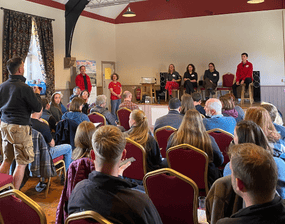
Just over 50 practitioners, academics, regulators, and consultants attended the NFM CoP, designed to strengthen how we monitor the impacts of NFM across Yorkshire.
On Friday 11 April, Kirkby Malham Parish Hall hosted the Yorkshire Natural Flood Management (NFM) Community of Practice (CoP) Monitoring Skill Share event.
Supported by Ousewem and local teams from the Environment Agency, the event gave space for practical learning, honest reflection, and collaborative problem-solving - helping to shape better monitoring across the region.
Sharing what works - and what doesn’t
The morning featured a series of short presentations from across the NFM community:
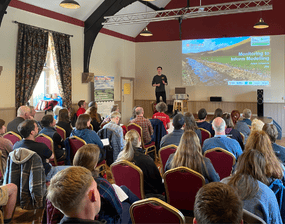
- The EA’s regional NFM monitoring programme, aimed at capturing baseline flow data to better understand Yorkshire’s hydrological regime.
- Ousewem’s approach, combining landowner-led visual tools with more technical data collection to support our catchment-scale modelling.
- University of Leed’s work with the National Trust Skell Valley project, sharing lessons on equipment choice and data interpretation.
- The Environment Agency’s Otterburn project, where monitoring is supporting flood model calibration.
A clear message throughout the morning: good monitoring begins with a clear question. Collecting data for its own sake rarely delivers impact - but focused monitoring can support everything from better flood models to long-term land management decisions.
Dr Steph Bond, Impact Translation Fellow with iCASP, said:
There’s often uncertainty around why data is being collected or what happens to it. This event helped shift the conversation from just collecting data to using it effectively.
Shaping better practice
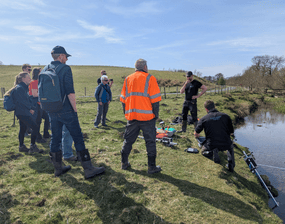
After lunch, participants visited a nearby site with existing NFM features, including leaky barriers and small bunds. The Environment Agency team led hands-on sessions demonstrating the hydrology and telemetry methods of measuring flow.
These outdoor demos gave attendees the chance to test equipment, ask practical questions, and discuss real-world monitoring challenges - from equipment maintenance to data storage and accessibility.
A pre-event survey captured monitoring approaches already in use across Yorkshire, from stage boards to drone footage. That insight, combined with learnings from the day, will help develop a shared resource for the NFM Community of Practice - including: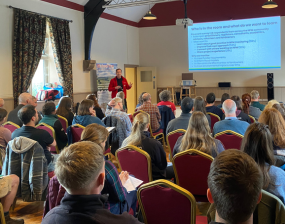
- A list of equipment used and where to get support
- Tips and pitfalls for setting up and maintaining kit
- A possible letter to Defra on how future funding can better support meaningful monitoring
For Ousewem, sponsoring this event was a strategic decision.
Mark Henderson, Flood Risk Manager, City of York Council, said:
We see monitoring not as a tick-box exercise, but as a decision-making tool that shapes investment, policy and long-term resilience. Sponsoring this event aligns with Ousewem’s commitment to evidence-led NFM - and to working openly with others to improve outcomes across the region.
What’s next?
Ousewem will support the follow-up work emerging from this event - including shared learning resources for the Yorkshire NFM Community of Practice and future opportunities to connect.
Ousewem is actively advancing its commitment to evidence-based natural flood management (NFM) through several initiatives:
Upcoming video series instalment
We are developing the next instalment in our video series on NFM, focusing on the critical role of monitoring in shaping effective strategies. Footage from the recent NFM Monitoring Skill Share event will feature, highlighting collaborative efforts and practical insights. This video builds upon our previous releases which you can find here and on our YouTube channel.
The forthcoming video will delve into the evidence underpinning NFM interventions and how shared monitoring approaches can enhance on-the-ground outcomes.
New 2025–26 Living Labs in focus
In collaboration with partners such as the Yorkshire Dales Rivers Trust, Ousewem is supporting student-led research to address current gaps in the NFM field:
- Owain Wells is assessing how leaky dams influence flow regimes in the upper catchment. By collecting flow rate data above and below NFM features, he’s investigating how interventions affect peak flow and lag time. With a decade of commercial archaeology experience behind him, Owain is now studying Sustainability Science at the University of York, focusing his research on practical, nature-based solutions to flooding.
Soil aeration monitoring initiative
We are also initiating soil aeration trials in the upper catchments of the River Nidd, specifically Crimple Beck upstream of Burn Bridge. This project aims to test how aeration improves soil water storage, contributing to flood resilience and healthier catchments. We are seeking participation from local farmers to make this initiative a success. For more details, visit our news article: Unlocking the power of monitoring for natural flood management.
Get involved
The Natural Flood Management (NFM) Community of Practice (CoP) was set up by iCASP to bring together those working on NFM across Yorkshire. These quarterly, invite-only meetings are an opportunity to share learning, discuss challenges, and build regional capacity – including through informal CPD and site-based visits to see real interventions in practice.
If you would like to attend a meeting, please email [email protected] with ‘NFM Community of Practice invitations’ in the heading.
Can you support our next trial?
Ousewem is still preparing to test soil aeration as a natural flood management technique in the upper catchments of the River Nidd – specifically Crimple Beck upstream of Burn Bridge. We’re looking for local farmers and landowners who may be willing to get involved.
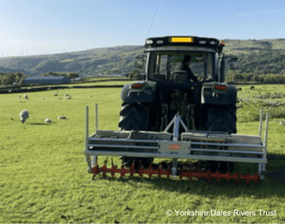
By taking part you can:
- Explore how soil aeration benefits your land and soil health
- Contribute to research on how aeration affects flood risk and water quality
- Help build a more resilient landscape for local communities and downstream areas like York
Are you a farmer in the Crimple Beck at Burn Bridge who could help? Or do you know someone who might be interested? Get in touch with us today to find out more and to arrange an initial soil assessment.
Also see

